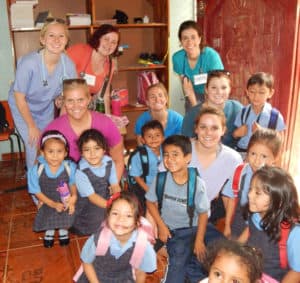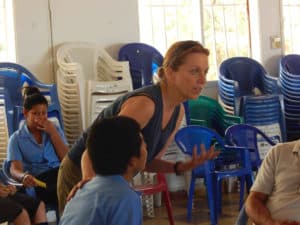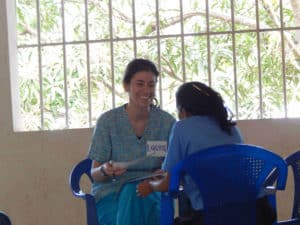March24,2015
Coming to Honduras for the first time, many things might make you feel uneasy because they are different from the environment your body and brain are accustomed to. But the consciousness of that, just what is different and why it makes you uneasy, lags behind the feeling itself. There are biological reasons for that, but suffice it to say it takes a little time for you to figure out what’s different here. One thing you’ll figure out rather quickly, however, especially if you’re over 30 years old, is that there is a superabundance of young people. Anywhere you go in public, they just seem to swarm about you. It’s pretty easy for your conscious brain to figure that out. The median age of the population here is 20.7 years and the life expectancy 74. In the US, the median age is 36.9 and the life expectancy 79.8. That’s a huge difference. Public and social life is dramatically different here because of it.

Life for adolescents and young adults is much more structured in the US than here. In the US, almost everyone is in school until at least 18 years of age, and a significant proportion continue with higher education. In Honduras, 60% have finished their education by the sixth grade, much fewer attend or graduate high school, and in realty almost no one goes on to higher education. In the US, young people who are not in school are generally in the work force. In Honduras, those who are in the work force are generally pretty young, but work itself is pretty scarce. Besides these two most obvious and striking differences for the socialization and personal development of youth, the countless supports for adolescents and young adults in the US are rare to non-existent here. Here, families and culture are the principle, if not the only, supports for adolescent development. Some families provide this support superbly. But many families are simply too challenged. Mothers are too young, fathers are too distant or not present at all, financial hardships are too demanding, and older siblings take on parenting roles too young. There are already too many young people, their numbers expand exponentially, and all the while the structures and supports to be a healthy, happy young person are shrinking.

Dr. Martha Kubik and the student nursing brigade from the University of Minnesota have been in Southern Intibucá this past week. Their focus, a much needed focus, is adolescent youth. Laura and I met up with them in Camasca at the High School. We were with them in the auditorium where they were seeing fifteen to twenty year olds. Dr. Kubik was very busy organizing the event, but she had a few minutes to speak with me. With a beaming smile she said to me, “Look at these kids, aren’t they wonderful. They’re just like kids in the US.” I have to admit her statement initially threw me. The difference in experience for kids in Honduras and kids in the US is stark. Honduran kids face challenges that, quite frankly in my opinion, no kid should face. But, I had the opportunity to observe the kids gathered in the auditorium and reflect on what she said. First I recognized that what she said was absolutely correct. Second, I realized that she fully appreciates the challenges for Honduran youth and was responding to them justly and with compassion.
There is a universal experience to what it means to be an adolescent. There is a biological component and its consequent expression in socialization. I watched how the kids touched one another, testing and experimenting. I watched their vivid, almost exaggerated, expressions; moved deeply it seems by life’s fullness and its affect on them. They smile widely at one another, but alone, unwatched, deep sadness can cast shadows over that brilliance. Boys tease girls almost ceaselessly. Girls feign annoyance, glaring at them disapprovingly, then turn to their girl friends with knowing pride. They are insatiably curious. All of them questioned the cards they were given by brigade members. Two simple English words, “vitals” and “screening,” were written on the cards indicating the two procedures they were to have. All of them wanted to know what the words meant. The brave ones called me or one of the interpreters over to translate. A very industrious, young man left the auditorium and returned with an English-Spanish dictionary. Unfortunately, it didn’t help. Challenge and discovery, fear and joy, love and rejection intensely fill their days. The world, their futures, are yet unexplored; terrifying demands and limitless opportunities. Whereas if I studied them carefully I could note the subtle cultural and environmental influences on their behavior, this would dishonor the primary influence of their journey. They are discovering who they are and how to be one with another.
 Dr. Kubik and the University of Minnesota, after extensive research and focus groups here in Honduras, have designed an interviewing tool to use among adolescent, Honduran youth. First they are weighed, measured for height, and have their blood pressure checked. Then they sit down individually, one on one, to dialogue over a few key themes of how to be a young person. Two of the brigade members were Spanish-speaking, and three were assisted by translators. The interview speaks to nutrition, exercise, sports, socialization, relaxation, and a variety of youth health themes. It also touches upon mental health, sexuality, and drug use. The content is excellent. There is no demand that the young person converse. Some might. Most don’t. But they know that many of the things they’ve been feeling are not a mystery. It’s the normal process of life and socialization. If something is discovered in the process that gives concern for the well-being or the health of the young person, a referral is made.
Dr. Kubik and the University of Minnesota, after extensive research and focus groups here in Honduras, have designed an interviewing tool to use among adolescent, Honduran youth. First they are weighed, measured for height, and have their blood pressure checked. Then they sit down individually, one on one, to dialogue over a few key themes of how to be a young person. Two of the brigade members were Spanish-speaking, and three were assisted by translators. The interview speaks to nutrition, exercise, sports, socialization, relaxation, and a variety of youth health themes. It also touches upon mental health, sexuality, and drug use. The content is excellent. There is no demand that the young person converse. Some might. Most don’t. But they know that many of the things they’ve been feeling are not a mystery. It’s the normal process of life and socialization. If something is discovered in the process that gives concern for the well-being or the health of the young person, a referral is made.
When the interviews were over, I watched the brigade members coming back together with the group. They all displayed a satisfied, even joyful, expression. I asked each of them how it went. They all thought it was meaningful. They all seemed to gain a sense of fulfillment. I imagined that for many of these kids this might be the only time someone has explained some of what they are feeling. How essentially important that is! When we honor someone else’s experience, when we can reflect our common humanity, we are sharing a precious gift. Though there is so much more the kids in Honduras need, without this gift of honoring, we would simply miss the real point of it all.
 Thank you Dr. Kubik and all of the Minnesota nursing students for honoring the youth of Honduras.
Thank you Dr. Kubik and all of the Minnesota nursing students for honoring the youth of Honduras.


